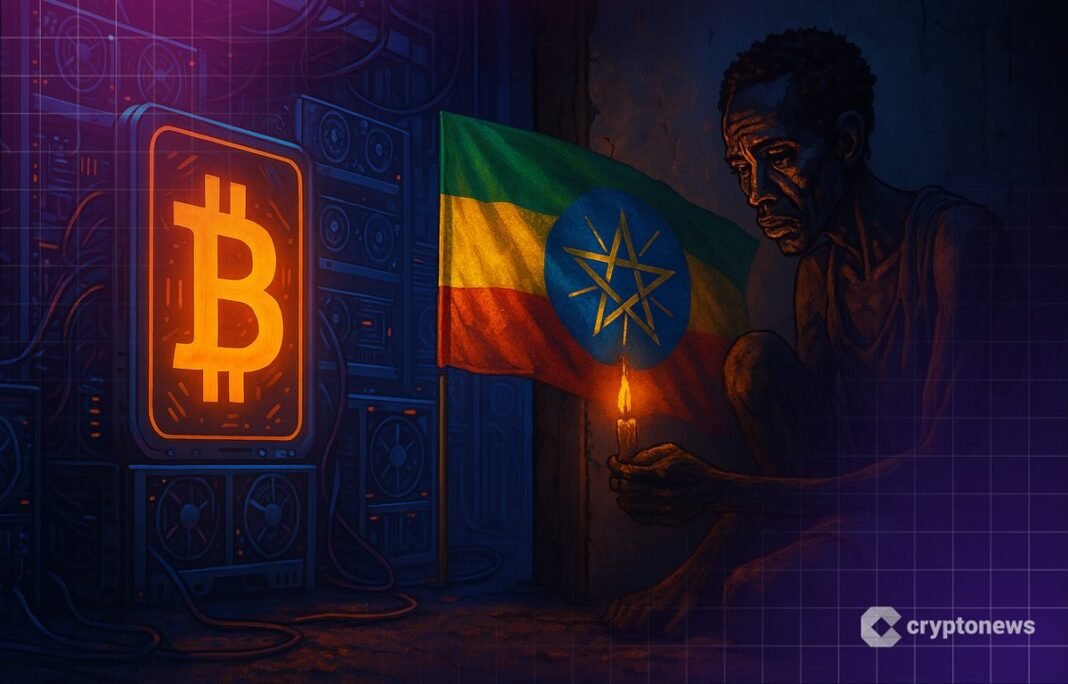Key Takeaways:
- Ethiopia has stopped issuing new electrical energy provide permits to Bitcoin mining corporations as a result of it can not meet demand.
- It comes as 57 million Ethiopians nonetheless lack entry to electrical energy, elevating issues over nationwide priorities.
- Ethiopia’s state energy firm reported $220 million in Bitcoin mining income over the previous yr.
Ethiopia has stopped issuing new electrical energy provide permits to Bitcoin mining firms as a result of it could actually now not meet new demand, in keeping with Ashebir Balcha, CEO of state energy utility Ethiopian Electrical Energy (EEP).
It comes amid issues that the Ethiopian authorities is prioritizing revenue over the welfare of its residents. Fifty-seven million folks — virtually half the inhabitants — nonetheless dwell with out electrical energy on account of a scarcity of transmission infrastructure.
In the meantime, Ethiopia has devoted 600 megawatts (MW) of electrical energy to Bitcoin mining — about 11% of the nation’s present producing capability of 5,631 MW, per the EEP web site. It’s sufficient power to energy half of Addis Ababa, the Ethiopian capital metropolis, in keeping with a brand new BBC Africa report.
“From our present evaluation, entry seems to be at capability,” Balcha mentioned, as reported by Ethiopian information outlet Shega. He was talking throughout the EEP’s annual efficiency overview held in Addis Ababa final week.
Ethiopia’s Bitcoin Mining Growth
Bitcoin mining is booming in Ethiopia, the second most populous nation in Africa after Nigeria. Since 2023, round 27 firms have been licensed to mine Bitcoin in Ethiopia, in keeping with a report by crypto agency Bitcoin Birr.
Almost 20 extra international firms are at present on a ready record. Miners are drawn to Ethiopia’s low-cost hydroelectric energy, produced primarily from the Grand Ethiopian Renaissance Dam (GERD), one among Africa’s largest energy tasks.
The report says miners pay $3.60 per kilowatt hour (kWh) of electrical energy after tax, making the price of electrical energy for miners within the East African nation considerably decrease than the common in different markets.
On common, every Bitcoin mining machine primarily based in Ethiopia generates a revenue of $5.71 a day, making it a profitable enterprise. Some miners have put in as many as 50,000 Bitcoin miners at their amenities.
Kal Massa, founding father of Bitcoin Birr, says Ethiopia now accounts for five% of Bitcoin’s complete computing energy, or hashrate, up from about 2.5% in January. Growing hashrate suggests miners are bullish about making income.
For Ethiopian Electrical Energy, the choice to promote electrical energy to Bitcoin miners has been equally worthwhile. The state-run energy utility reportedly generated greater than $200 million in income from mining in 2025 alone.
Some analysts initially disputed the income figures. “This was an early estimate,” Massa informed Cryptonews. “The actual quantity is $25 to $28 million a month being made by EEP from Bitcoin miners (sic).”
Posting on X, Bitcoin mining analyst Daniel Batten mentioned EEP wanted a median of 1.2 gigawatts mining at anyone time between Jan-June 2025 to realize these revenues at $31-35 per megawatt hour (MWh).
“Contemplating there was solely 600MW in Oct 2024, that [$200 million revenue] appears on the excessive facet,” he mentioned.
They might've wanted a median of 1.2GW mining at anyone time between Jan-June 2025 to realize these revenues at $31-35/MWh. Contemplating there was solely 600MW in Oct 2024, that appears on the excessive facet.
— Daniel Batten (@DSBatten) July 5, 2025
Nonetheless, newest figures from Ethiopian Electrical Energy present that the utility earned $338 million in income from the sale of electrical energy to neighboring international locations and Bitcoin miners. The income is for the 2024/2025 fiscal yr.
Round 35%, or $118 million, of the whole quantity got here from energy exports to Djibouti, Kenya, and Sudan, the Ethiopian Press Company experiences. The rest, $220 million, got here from knowledge mining, together with crypto mining.
Ethiopian laws classify Bitcoin mining below knowledge mining.
Social Dilemma as Hundreds of thousands Lack Electrical energy
Ethiopia plans so as to add 5,000 MW of electrical energy to the nationwide grid from its GERD venture over the subsequent few months. The nation is aiming to develop its income from regional exports and Bitcoin mining to $427 million by 2026.
It implies that the suspension on issuing energy buy agreements for miners will seemingly be lifted as nicely.
Critics query the knowledge of dedicating a bit of Ethiopia’s restricted power to mining for short-term achieve whereas thousands and thousands nonetheless lack entry to fundamental electrical energy companies.
Over 45% of Ethiopia’s inhabitants, estimated at 120 million, dwell with out energy, and even in main cities, blackouts are frequent.
“I feel the problem of Bitcoin Mining is of concern,” David Gitonga, founding father of Kenya-based crypto platform BitKE, informed CNBC Africa.
“It’s a report from the federal government of Ethiopia that truly raised this concern as a result of… a big a part of the inhabitants, 50%, nonetheless do not need entry to electrical energy,” Gitonga mentioned, including:
“The actual concern is about priorities: ought to [Ethiopia] be mining Bitcoin and making $400 million yearly, or ought to we be prioritizing giving residents electrical energy? There must be a stability [between the two].”
Gitonga fears that income from mining could not result in enhancements in power entry for the poor as shortly as is important. He says Ethiopia ought to implement insurance policies that compel miners to prioritize group wants, like in different international locations.
Nonetheless, Bitcoin Birr founder Massa says there’s calculated rationale behind Ethiopia’s electrical energy gross sales to cryptocurrency miners, telling Cryptonews:
“It’s a technical technique. One third to at least one half of our [Ethiopia’s] power is stranded. This extra power might be offered as an alternative of it dissipating into the environment.”
Stranded power refers to electrical energy generated however not used, typically as a result of lack of ability to transmit it to areas of demand.
Ethiopia has surplus power in some areas, however a scarcity of transmission traces and substations means a lot of it could actually’t attain cities or rural communities.
Consultants say Bitcoin miners present a prepared marketplace for stranded energy as a result of they will function virtually wherever with a dependable power supply.

Mining ‘Jumpstarts’ Infrastructure Growth
Regardless of new vegetation just like the Grand Ethiopian Renaissance Dam, Ethiopia has fewer than 200 substations, a fraction of what’s truly wanted to ship energy to the thousands and thousands of people that nonetheless dwell at midnight.
“The nation will want not less than 10 occasions that quantity as the massive inhabitants joins the center class and extra folks buy water heaters and electrical stoves,” Massa mentioned, noting:
“Bitcoin miners are serving to jumpstart this funding, which can profit the business sectors and residential consumers of power.”
He cited Ercot in Texas, U.S., the place versatile demand from knowledge facilities helps “stability the grid” by matching provide and demand over 24 hours. Requested about who advantages essentially the most from mining in Ethiopia, Massa mentioned, “Everybody advantages.”
“There are dozens of Bitcoin miners in varied areas all through Ethiopia buying in any other case wasted power, rising the tax base and using lots of, if not hundreds of community engineers, electrical engineers, and associated professions from the worth chain.”
Moges Mekonnen, the EEP communications director, didn’t reply to a request for remark. Nonetheless, Balcha informed BBC Africa that cash raised from Bitcoin mining shall be used to develop Ethiopia’s electrical energy community.
“We are able to develop our community by way of the income we’re getting from this knowledge mining enterprise (sic),” mentioned the Ethiopian Electrical Energy CEO. “We’ll develop our transmission and distribution community.”
Over the past yr, EEP reportedly constructed 28,571 kilometres of latest transmission traces, partly funded by the income from Bitcoin mining. Greater than 8,700 substation bays had been additionally put in throughout the yr, Birr Metrics experiences.
The publish As Bitcoin Mining Grows, 57 Million Ethiopians Stay within the Darkish appeared first on Cryptonews.
